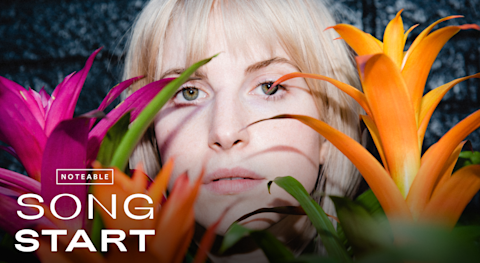Paramore’s Hayley Williams on How Artists Can Avoid Burnout

The veteran star gives tips on artistry and mental health in our educational Song Start series.
Whether you’re selling out stadiums or playing your first gigs on a shoestring budget, life in the music industry can feel like a constant hustle. Artists are often trying to focus on their primary job of writing, recording music, and playing shows while dealing with the plethora of unforeseen business decisions that come with a music career. All of those factors can leave both aspiring and seasoned musicians feeling stretched thin, overworked, and burned out.
As part of our educational Song Start series, we sat down with veteran Paramore frontwoman and accomplished solo artist Hayley Williams to learn more about finding longevity in the music industry and dealing with burnout along the way.
“I do think that burnout is somewhat inevitable,” Williams cautions. “There are times where – not necessarily even for a negative reason – you'll overwork yourself and you won't know. Or there's times that you think you're making the right decision, and maybe you don't know [everything] that decision entails. But I do think that you can take all those lessons in stride, and they stack up and build your foundation.”
Williams explains that she often feared speaking up about needing time to rest or deal with mental health issues because she thought it would jeopardize her career opportunities. She's also grappled with guilt about appearing ungrateful for her band’s success.
“People that do music that have any degree of success, I think that it actually gets harder to ask for help,” she muses. “Because it's embarrassing. People think, ‘They're making money. They live in a [nice] home. They probably have everything they ever dreamed of.’”
For Williams, the reality wasn’t that simple. “[I spent] 15, 16 years in a band that makes a living being a band,” she says. “And I can tell you with full confidence, it's just not happiness.”
The Tennessee native also laments our culture’s obsession with gossip and celebrity breakdowns, particularly when it comes to women. “I think it takes a lot of courage to choose a path to health, and mental health in particular, because it's a lot of work, and people don't seem as interested in health and happiness as they do in people's breakdowns,” she says. “I'm guilty of that too.”
Williams knows firsthand how the pressures of fame can cause problems. In 2008, the band was riding a massive wave of success from its sophomore album Riot! when it abruptly canceled the remainder of its European tour, citing “internal issues.”
“We weren't equipped to deal with the success that was thrown at us,” Williams explains, saying the young band members wrestled with an “obligation” to their new fanbase despite being overwhelmed by their career trajectory. “It was really hard to come off that tour. But it was really good for us,” she says.
Paramore took another prominent hiatus following the release of 2017’s After Laughter, an album that chronicled Williams’ battle with depression and PTSD. She used the time to record and release two solo albums, creative endeavors she never thought she’d get the chance to undertake. She views this creative process as cathartic.
“It creates an opportunity for corrective experience when you're able to sit and write through your feelings more,” she said of the healing strength she finds in songwriting. “I'm such a visual person. Seeing it on paper versus it being this nebulous thing in my mind that’s swirling [around] is really helpful, because it becomes concrete. And I think the next step of catharsis is giving it away.”
Although the hiatus was sure to disappoint some fans, it hasn’t been a major detriment to the band’s career. In fact, Williams recently found out Paramore’s streaming numbers are higher than ever.
“Not only has [the break] been great for our minds, and our hearts, and even just our passion for playing music, but it's actually been such a great thing for our career,” she reveals. “Sometimes, saying ‘no’ is just as lucrative as saying ‘yes.’ I think saying ‘no’ has been a transformative experience for me.”
Williams ultimately advises artists to listen to their guts, stand up for what they believe in, and put themselves first.
“I think as long as you're flexing that muscle of discernment, that voice deep in your gut that says, ‘This isn't me,’ or, ‘This is me, and I'm going to fight for this,’ That's the thing to listen to,” she emphasizes. “It will always be there. It will be your constant companion, no matter if you're signing your first record deal or you're negotiating your masters.”
To hear more from Williams on navigating the music industry, avoiding burnout, and the nuances of making music, check out her Song Start episode below:
Click here to explore more videos and podcasts from Song Start, and take a look at our Year in Music: Wrapped – featuring Paramore as one of the Artists' Top Artists for 2021.
Spotify for Artists vous aide à développer la communauté de fans dont vous avez besoin pour atteindre vos objectifs.